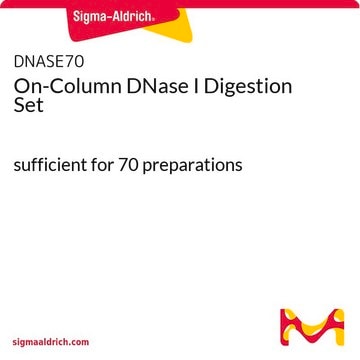STRN250
Spectrum™ Plant Total RNA Kit
sufficient for 250 purifications
Synonym(s):
Plant total RNA extraction kit, Plant total RNA isolation kit, Plant total RNA purification kit
About This Item
Recommended Products
usage
sufficient for 250 purifications
greener alternative product characteristics
Designing Safer Chemicals
Learn more about the Principles of Green Chemistry.
sustainability
Greener Alternative Product
technique(s)
RNA purification: suitable
greener alternative category
storage temp.
15-25°C
Looking for similar products? Visit Product Comparison Guide
Related Categories
General description
After grinding tissue to a fine powder in liquid nitrogen, cells are lysed and cellular debris is physically and chemically separated from endogenous RNA. RNA is then bound to a column supported silica substrate and several wash steps remove remaining contaminants.
Total RNA is eluted from the column and used in typical applications, such as Northern Blots, and RT- and qRT-PCR.
Application
- to extract RNA from the material ground in liquid nitrogen
- to isolate total RNA from mutant and wt (wild type) plantlets
- to extract total RNA from leaf samples
- to extract RNA from all plant tissues
Features and Benefits
- Yields up to 60 μg of pure concentrated RNA per prep
- Efficient protocol allows for RNA purification in 30 min or less
- Specially designed for research with difficult plant tissues
Legal Information
Signal Word
Danger
Hazard Statements
Precautionary Statements
Hazard Classifications
Acute Tox. 2 Dermal - Acute Tox. 3 Inhalation - Acute Tox. 3 Oral - Aquatic Acute 1 - Aquatic Chronic 2 - Eye Dam. 1 - Repr. 2 - Skin Irrit. 2 - Skin Sens. 1 - STOT RE 2 Oral
Target Organs
Liver,Heart
Storage Class Code
6.1A - Combustible acute toxic Cat. 1 and 2 / very toxic hazardous materials
Certificates of Analysis (COA)
Search for Certificates of Analysis (COA) by entering the products Lot/Batch Number. Lot and Batch Numbers can be found on a product’s label following the words ‘Lot’ or ‘Batch’.
Already Own This Product?
Find documentation for the products that you have recently purchased in the Document Library.
Customers Also Viewed
Our team of scientists has experience in all areas of research including Life Science, Material Science, Chemical Synthesis, Chromatography, Analytical and many others.
Contact Technical Service














